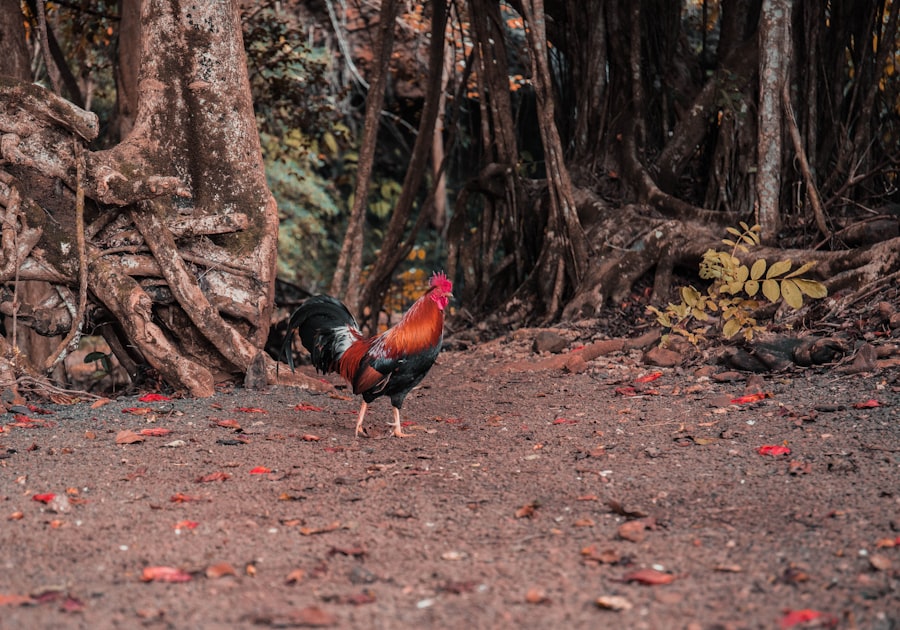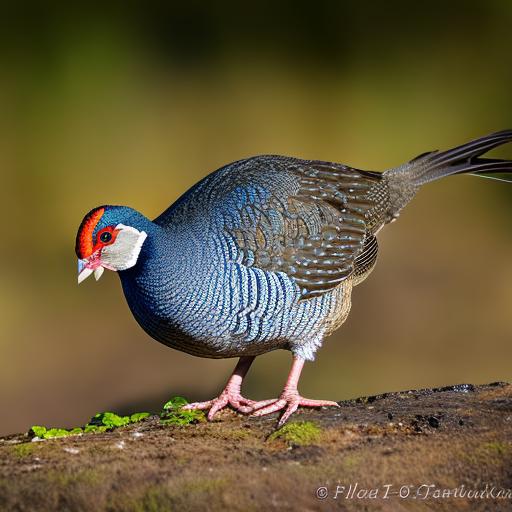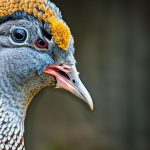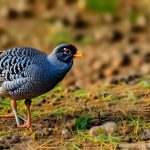Guinea fowl, also known as pintades, are a type of poultry that are native to Africa. They are closely related to other game birds such as pheasants and turkeys. Guinea fowl are known for their distinctive appearance, with speckled feathers and a helmet-like bony structure on their heads. They are also known for their loud and distinctive calls, which can be heard from a distance. Guinea fowl are popular for their meat, eggs, and pest control abilities. They are hardy birds that are relatively low maintenance, making them a popular choice for small-scale farmers and homesteaders.
Guinea fowl come in a variety of colors, including pearl, lavender, and white. They are social birds that prefer to live in flocks, and they are known for their strong flocking instincts. Guinea fowl are also excellent foragers, and they will spend much of their time searching for insects, seeds, and other small creatures to eat. They are also known for their ability to fly, and they will roost in trees at night to avoid predators. Overall, guinea fowl are unique and fascinating birds that have a lot to offer to those who choose to raise them.
Key Takeaways
- Guinea fowl are domesticated birds native to Africa, known for their pest control abilities and unique behavior.
- Guinea fowl are effective at controlling pests such as ticks, flies, and even small rodents like rats.
- Guinea fowl are natural predators of rats and can help keep rat populations in check on a property.
- Guinea fowl are social birds that thrive in flocks and have a varied diet including insects, seeds, and vegetation.
- Keeping guinea fowl can benefit a property by providing natural pest control, entertainment, and a sustainable source of eggs and meat.
Guinea Fowl as Pest Control
One of the main reasons why people choose to keep guinea fowl is their excellent pest control abilities. Guinea fowl are voracious insect eaters, and they will eagerly consume a wide variety of pests including ticks, flies, grasshoppers, and even small rodents. This makes them an invaluable asset for farmers and gardeners who are looking for a natural and sustainable way to control pests without the use of chemicals. In fact, guinea fowl have been used for centuries in Africa to control pests in agricultural fields, and they continue to be used for this purpose around the world today.
Guinea fowl are particularly effective at controlling ticks, which can carry diseases such as Lyme disease and Rocky Mountain spotted fever. Studies have shown that guinea fowl can significantly reduce tick populations in areas where they are allowed to forage freely. In addition to ticks, guinea fowl are also known for their ability to control other pests such as grasshoppers and flies. This can be especially beneficial for organic farmers who are looking for natural ways to protect their crops from insect damage. Overall, guinea fowl are an effective and environmentally friendly way to control pests on the farm or in the garden.
Guinea Fowl vs. Rats
Guinea fowl are not only effective at controlling insects, but they can also help to keep rat populations in check. Rats are a common pest that can cause damage to crops, spread disease, and create unsanitary conditions on the farm. Guinea fowl are natural predators of rats, and they will actively hunt and consume them when given the opportunity. This makes them an excellent addition to any farm or homestead that is dealing with a rat problem.
Guinea fowl are particularly effective at controlling rats because of their keen eyesight and quick reflexes. They are able to spot rats from a distance and will quickly pursue and capture them. In addition, guinea fowl are known for their loud calls, which can help to alert other birds and animals to the presence of rats. This can be especially useful in a farm setting where rats may be causing damage to crops or feed supplies. Overall, guinea fowl are a natural and effective way to control rat populations without the use of harmful chemicals or traps.
Guinea Fowl Behavior and Diet
Guinea fowl are social birds that prefer to live in flocks. They have strong flocking instincts and will often stay close together while foraging or roosting. Guinea fowl are also known for their loud calls, which they use to communicate with each other and to alert others to potential dangers. This can make them a noisy addition to the farm, but it also makes them effective at alerting other animals to the presence of predators or pests.
In terms of diet, guinea fowl are omnivorous and will eat a wide variety of foods. They are excellent foragers and will spend much of their time searching for insects, seeds, and other small creatures to eat. In addition to their foraging habits, guinea fowl can also be fed a commercial poultry feed that is specifically formulated for their nutritional needs. This can be especially important during the winter months when insects may be less abundant. Overall, guinea fowl are hardy birds that are well adapted to a variety of diets and living conditions.
Benefits of Keeping Guinea Fowl
There are many benefits to keeping guinea fowl on the farm or homestead. One of the main benefits is their excellent pest control abilities. Guinea fowl are voracious insect eaters and will eagerly consume a wide variety of pests including ticks, flies, grasshoppers, and even small rodents. This makes them an invaluable asset for farmers and gardeners who are looking for a natural and sustainable way to control pests without the use of chemicals.
In addition to their pest control abilities, guinea fowl are also known for their hardiness and low maintenance requirements. They are relatively easy to care for and can thrive in a variety of climates and living conditions. Guinea fowl are also excellent foragers and will spend much of their time searching for insects, seeds, and other small creatures to eat. This can help to reduce feed costs and provide a natural source of nutrition for the birds. Overall, guinea fowl are a valuable addition to any farm or homestead that is looking for a natural and sustainable way to control pests and improve overall farm health.
Tips for Introducing Guinea Fowl to Your Property

If you are considering adding guinea fowl to your farm or homestead, there are a few important tips to keep in mind. First, it is important to provide adequate shelter and protection for the birds. Guinea fowl will need a secure coop or shelter at night to protect them from predators such as foxes, raccoons, and owls. In addition, it is important to provide plenty of space for the birds to roam and forage during the day.
When introducing guinea fowl to your property, it is best to start with young birds that have been raised together. This will help them form a cohesive flock and reduce the likelihood of aggression or fighting among the birds. It is also important to provide plenty of hiding places and perches for the birds to roost on at night. This can help them feel safe and secure in their new environment.
Finally, it is important to be patient when introducing guinea fowl to your property. It may take some time for the birds to become acclimated to their new surroundings, so it is important to give them time to adjust at their own pace. Overall, introducing guinea fowl to your property can be a rewarding experience that can provide many benefits for your farm or homestead.
Guinea Fowl as Rat Deterrent
In conclusion, guinea fowl are unique and fascinating birds that have a lot to offer to those who choose to raise them. They are known for their distinctive appearance, loud calls, and excellent pest control abilities. Guinea fowl are natural predators of insects such as ticks, flies, grasshoppers, and even small rodents like rats. This makes them an invaluable asset for farmers and gardeners who are looking for a natural and sustainable way to control pests without the use of chemicals.
Guinea fowl are also hardy birds that are relatively low maintenance and can thrive in a variety of climates and living conditions. They are excellent foragers and will spend much of their time searching for insects, seeds, and other small creatures to eat. In addition to their pest control abilities, guinea fowl can also provide meat and eggs for the farm or homestead. Overall, guinea fowl are a valuable addition to any property that is looking for a natural and effective way to control pests and improve overall farm health.
Looking to keep your chicken coop free of pests? Check out our article on how to insulate a chicken coop for tips on creating a secure and comfortable environment for your poultry. Additionally, you may be interested in learning about how guinea fowl can help keep rats away from your coop. Find out more about this natural pest control method in our related article here.
FAQs
What are guinea fowl?
Guinea fowl are domesticated birds native to Africa. They are known for their distinctive spotted feathers and loud, chattering calls.
Do guinea fowl keep rats away?
Yes, guinea fowl are known to be effective at keeping rats away. Their loud calls and aggressive behavior towards small rodents can deter rats from entering an area.
How do guinea fowl keep rats away?
Guinea fowl are natural foragers and will actively hunt and peck at insects, small rodents, and other pests. Their presence and behavior can create a hostile environment for rats, discouraging them from staying in the area.
Are guinea fowl a sustainable and eco-friendly way to control rats?
Yes, using guinea fowl to control rats can be a sustainable and eco-friendly method. They do not rely on chemical pesticides or traps, and their natural behavior helps to maintain a balanced ecosystem.
Are there any drawbacks to using guinea fowl to control rats?
While guinea fowl can be effective at keeping rats away, they can also be noisy and may not be suitable for all environments. Additionally, they require proper care and housing to thrive.
Meet Walter, the feathered-friend fanatic of Florida! Nestled in the sunshine state, Walter struts through life with his feathered companions, clucking his way to happiness. With a coop that’s fancier than a five-star hotel, he’s the Don Juan of the chicken world. When he’s not teaching his hens to do the cha-cha, you’ll find him in a heated debate with his prized rooster, Sir Clucks-a-Lot. Walter’s poultry passion is no yolk; he’s the sunny-side-up guy you never knew you needed in your flock of friends!







